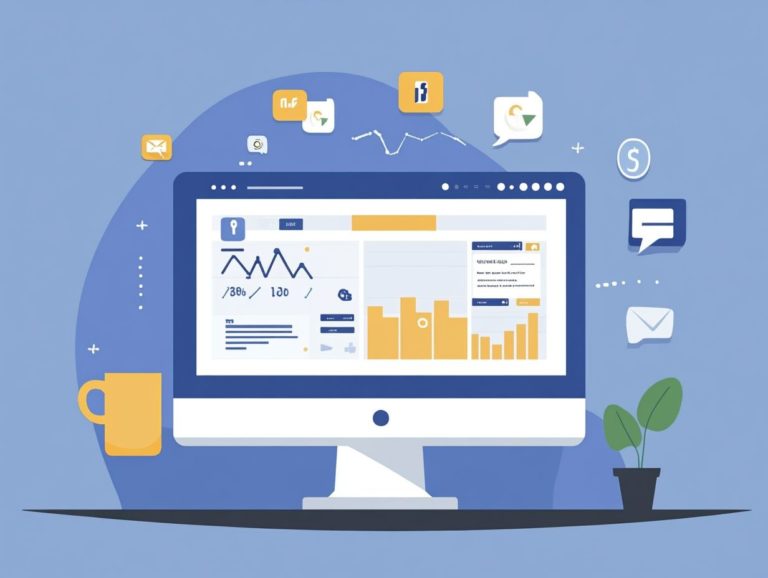What is Lead Generation in E-commerce?
Let's Set Up Your Lead Generation Strategy
Fill out the form below, and our team will get in touch with you to create a tailored solution for your business.
In the competitive realm of e-commerce, grasping the nuances of lead generation is essential for your success. This article delves into what lead generation entails in an online context, emphasizing its significance in driving online sales and engaging customers.
You’ll discover a step-by-step breakdown of the lead generation process, highlighting its numerous benefits. Additionally, effective strategies to optimize your landing pages and calls-to-action will be shared, including mobile optimization and personalized marketing.
Key metrics and tools will help you track your progress, allowing you to stay firmly on the path to growth and success.
Contents
- Key Takeaways:
- Understanding Lead Generation in E-commerce
- How Lead Generation Works in E-commerce
- Let's Set Up Your Lead Generation Strategy
- Benefits of Lead Generation for E-commerce
- Effective Strategies for Lead Generation
- Let's Set Up Your Lead Generation Strategy
- Measuring Success in Lead Generation
- Frequently Asked Questions
- Let's Set Up Your Lead Generation Strategy
Key Takeaways:

- Lead generation is the process of attracting and converting potential customers into qualified leads for businesses selling products or services online.
- Effective lead generation can lead to increased sales and customer engagement, making it a crucial aspect of e-commerce success.
- Strategies such as optimizing landing pages and using calls-to-action can help businesses generate high-quality leads and measure success through key metrics and tracking tools, including website optimization and tracking progress.
Understanding Lead Generation in E-commerce
Lead generation in e-commerce is an important part of online marketing. It draws in prospective customers and transforms them into qualified leads. In today’s fiercely competitive landscape, it’s essential to effectively connect with your target audience.
This means harnessing a variety of marketing strategies, including SEO, PPC, and social media. Focus on creating content that grabs attention, optimizing product descriptions, and leveraging user-generated content to bolster brand awareness and foster loyalty.
Definition and Importance
Lead generation in e-commerce is all about attracting and converting potential customers into interested leads using various marketing strategies. This multifaceted approach includes techniques like content marketing, social media outreach, and email campaigns.
All these strategies aim to engage potential buyers before they decide to make a purchase. Effective lead generation is essential for driving customer retention; it lays a solid foundation for ongoing relationships, ensuring that these prospects not only make their initial purchases but also return for more.
By implementing tailored marketing strategies, you can significantly boost your online sales and cultivate brand loyalty. As you gather valuable insights into customer preferences and behaviors, you’ll refine your marketing efforts, ultimately leading to a more resilient and responsive e-commerce landscape.
How Lead Generation Works in E-commerce
Understanding the mechanics of lead generation in e-commerce involves grasping the nuanced steps within the conversion funnel. This process starts from attracting visitors and cultivating them into loyal customers.
To excel in this arena, deploy a blend of traffic generation strategies—think SEO, PPC, and social media outreach—that effectively channel potential customers to well-optimized landing pages.
Once they arrive, leverage targeted email marketing campaigns and compelling calls-to-action to deepen engagement and convert those leads into actual sales.
Step-by-Step Process

The step-by-step process of lead generation in e-commerce begins with attracting potential customers using various traffic generation methods.
These methods include content marketing, social media outreach, SEO, and paid advertising. They are carefully designed to guide interested individuals to your brand’s online presence.
Let's Set Up Your Lead Generation Strategy
Fill out the form below, and our team will get in touch with you to create a tailored solution for your business.
Once you’ve successfully drawn in traffic, the next crucial step is capturing leads. This is done through effective landing pages, forms, and enticing offers like discounts or informative newsletters. This strategy helps you quickly gather essential contact details to boost your marketing efforts.
After acquiring their information, nurturing those relationships becomes very important. Regular communication through email marketing or social media engagement helps you build trust with your audience.
The ultimate goal is to convert these nurtured leads into actual sales. This depends on understanding customer behaviors and optimizing conversion rates, which is simply the percentage of visitors who make a purchase.
By employing diverse marketing channels and analyzing their effectiveness, you can ensure a robust and effective approach to lead generation.
Benefits of Lead Generation for E-commerce
Lead generation brings a wealth of advantages for e-commerce businesses, mainly through increased sales, heightened customer engagement, and fortified brand loyalty.
Attracting and nurturing leads boosts your ROI and builds strong relationships with your target audience.
This approach paves the way for repeat business and long-term success, turning casual shoppers into loyal customers.
Increased Sales and Customer Engagement
Increased sales and enhanced customer engagement are two of the most compelling benefits of effective lead generation in e-commerce.
By establishing a robust lead generation framework, you can capture valuable customer data and insights. This enables you to tailor your marketing strategies for maximum impact.
Nurturing leads through targeted content and personalized marketing communication encourages them to engage more with your brand. This approach builds trust and promotes repeat purchases.
Leveraging digital marketing tools like SEO, email campaigns, and social media ads significantly amplifies the reach and effectiveness of your lead generation efforts. A well-structured lead generation strategy drives sales and cultivates lasting customer relationships, leading to a loyal customer base that keeps coming back for more through effective advertising campaigns.
Effective Strategies for Lead Generation
Implementing effective lead generation strategies is crucial for e-commerce businesses aiming to expand their customer base and boost conversion rates. This involves optimizing landing pages, creating compelling calls-to-action, and integrating user-generated content to foster trust and authenticity in your brand.
Optimizing Landing Pages and Calls-to-Action

Optimizing your landing pages and calls-to-action is essential for maximizing your lead generation efforts in e-commerce.
To achieve this, adopt a strategic approach that prioritizes user experience and persuasive design elements. By thoughtfully considering layout, color schemes, and compelling copy, you can create a seamless journey for potential customers that captures their attention and encourages interaction.
Let's Set Up Your Lead Generation Strategy
Fill out the form below, and our team will get in touch with you to create a tailored solution for your business.
Using clear, engaging visuals and actionable language in your calls-to-action can significantly boost engagement rates. It’s vital to test different versions of these elements to find out what resonates best with your target audience. This allows for effective segmentation in your marketing efforts.
This way, you’ll unlock the full potential of conversion rate optimization and drive sustained growth in lead generation.
Measuring Success in Lead Generation
Measuring success in lead generation is essential for your e-commerce business to grasp its performance and make informed decisions regarding marketing strategies.
By leveraging key metrics and analytics tools, you can evaluate ROI and ascertain the effectiveness of your lead generation efforts. This insight gives you the power to refine your approach and drive greater success in your marketing initiatives.
Key Metrics and Tools for Tracking Progress
Identifying key metrics and utilizing analytics tools is crucial for effectively tracking your progress in lead generation efforts.
Closely monitoring elements like conversion rates, engagement levels, and overall funnel performance provides valuable insights into your lead generation strategies.
Understanding how many leads convert into paying customers will help you refine your approaches and optimize your resource allocation. Engagement metrics, such as email open rates and click-through rates, provide essential data about how well your content captures interest.
Tracking the source of your leads—whether they come from social media, paid ads, or organic search—allows you to pinpoint which channels deliver the best results.
Employing comprehensive tracking methods, such as customer relationship management (CRM) systems and marketing automation software, can elevate your evaluations, enabling you to make better-informed decisions and craft more effective strategies moving forward.
Frequently Asked Questions
What is Lead Generation in E-commerce?

Lead generation in e-commerce refers to the process of identifying and attracting potential customers to your online store. The goal is to convert them into paying customers through effective promotions.
Why is Lead Generation Important in E-commerce?
Lead generation is vital for boosting your online sales and taking your e-commerce business to the next level! It drives website traffic, increases brand awareness, and helps you generate sales.
How Does Lead Generation Work in E-commerce and Digital Marketing?
Lead generation in e-commerce typically involves creating targeted campaigns and utilizing various marketing channels.
These channels include social media, email marketing, and search engine optimization (SEO), to attract potential customers to your website and capture their information for future marketing efforts, enhancing customer retention.
Let's Set Up Your Lead Generation Strategy
Fill out the form below, and our team will get in touch with you to create a tailored solution for your business.
What are the Different Types of Lead Generation and Marketing Strategies in E-commerce?
There are various types of lead generation in e-commerce, including inbound marketing, content marketing, social media marketing, email marketing, PPC, and paid advertising.
Each of these methods can be used to attract potential customers to your online store and generate qualified leads.
How Can I Measure the Success of Lead Generation and Conversion Rate Optimization in E-commerce?
You can measure the success of lead generation in e-commerce by tracking metrics such as website traffic, conversion rates, engagement, and consumer behavior.
These metrics will help you identify which lead generation strategies are most effective for your business and improve your conversion funnel.
Are There Any Tools or Software for Lead Generation, Analytics Tools, and Customer Experience in E-commerce?
Yes! There are plenty of tools and software available to assist with lead generation in e-commerce. These include lead capture forms, customer relationship management (CRM) systems, email newsletters, and marketing automation software.
These tools can help streamline and optimize your lead generation efforts while enhancing your brand awareness.






